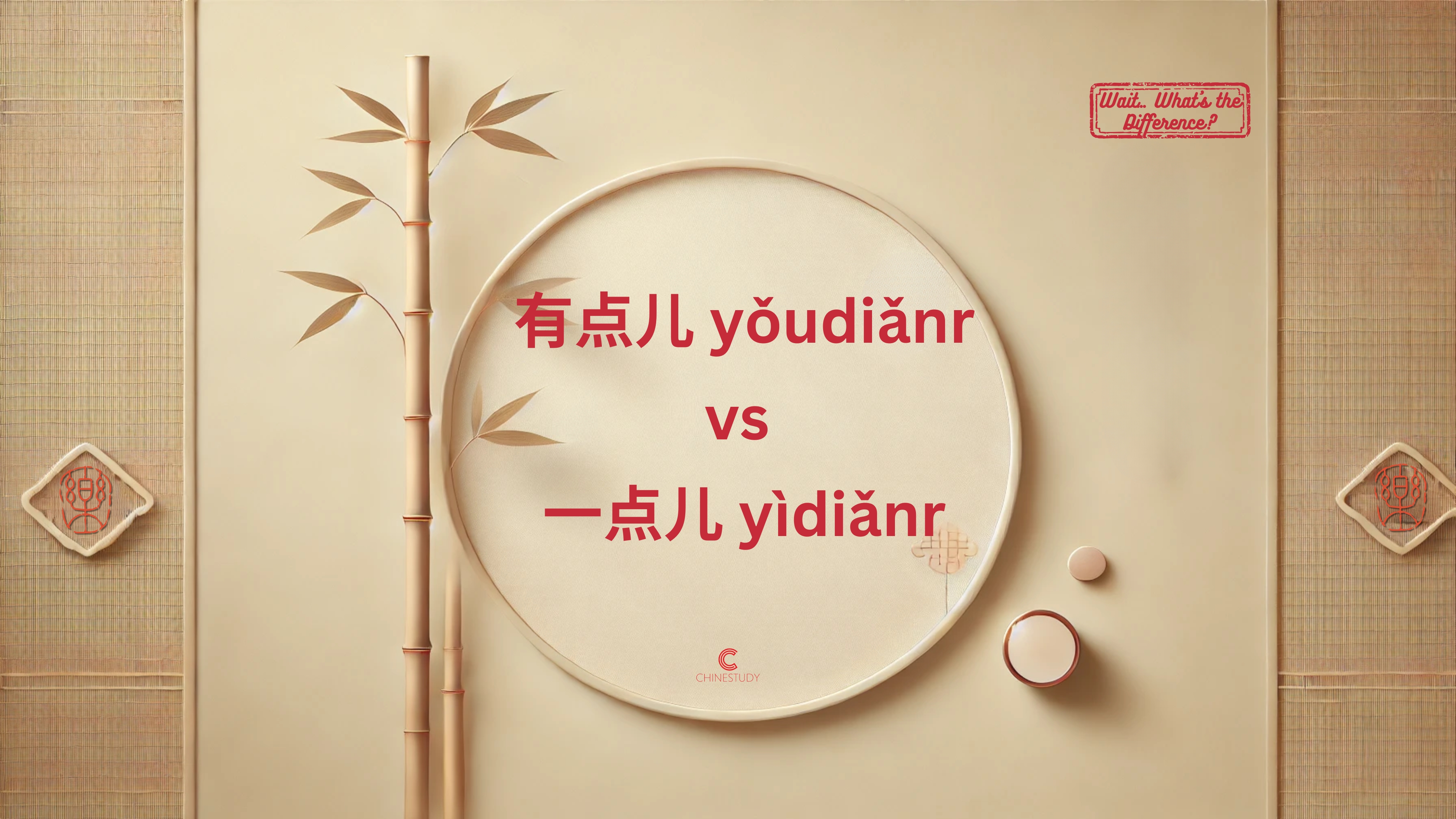|
Expression |
Used with |
Feeling |
|---|---|---|
|
有点儿 (yǒudiǎnr) |
Before adjective / Verb |
Emotion or opinion, often negative |
|
一点儿 (yìdiǎnr) |
Before noun / after verb |
Amount or quantity |
🧐 有点儿 yǒudiǎnr vs 一点儿 yìdiǎnr – What’s the Difference?

Both of these words can be translated as “a little”, but they’re used very differently.
Let’s make it super clear!
🔍 Breakdown
🟡 有点儿 (yǒudiǎnr) – a bit too (usually not good)
- Used before adjectives or verbs.
- Often shows a negative emotion or opinion — something you’re not happy about.
🟢 一点儿 (yìdiǎnr) – a little bit of… / some / a little more
- Used before nouns to show quantity.
- Can also follow adjectives/verbs to show a comparative degree.
💬 Easy Examples
✅ 有点儿 (yǒudiǎnr) – a bit too (usually not good)
- 今天有点儿冷。Jīntiān yǒudiǎnr lěng.
- 👉 It’s a bit cold today.
- 💡 Shows discomfort with the weather (negative feeling).
- 我有点儿忙,不能去。Wǒ yǒudiǎnr máng, bù néng qù.
- 👉 I’m a bit busy and can’t go.
- 💡 Being too busy causes a problem.
- 他有点儿不高兴。Tā yǒudiǎnr bù gāoxìng.
- 👉 He’s a little unhappy.
- 💡 Used before a negative emotion.
📌 有点儿 is not used with positive feelings like 开心 (kāixīn) or 有趣 (yǒuqù).
✅ 一点儿 (yìdiǎnr) – a little bit / some / a little more
- 给我一点儿水。Gěi wǒ yìdiǎnr shuǐ.
- 👉 Give me a little water.
- 💡 Used before a noun to show quantity.
- 我买了一点儿水果。Wǒ mǎi le yìdiǎnr shuǐguǒ.
- 👉 I bought some fruit.
- 💡 Refers to a small amount of fruit.
- 他会说一点儿中文。Tā huì shuō yìdiǎnr Zhōngwén.
- 👉 He can speak a little Chinese.
- 💡 Used after the verb to show limited ability.
- 你可以说慢一点儿吗?Nǐ kěyǐ shuō màn yìdiǎnr ma?
- 👉 Can you speak a little slower?
- 💡 Follows an adjective to suggest comparison.
✍🏻 一点儿 shows quantity or a comparative degree.
✏️ Quick Summary
⚠️ Common Mistakes (Watch Out!)
1️⃣
- ❌ 我一点儿冷。Wǒ yìdiǎnr lěng. (Wrong!)
- ✅ 我有点儿冷。Wǒ yǒudiǎnr lěng.
- 👉 I feel a bit cold.
- 💡 Use “有点儿” before adjectives like “cold.”
2️⃣
- ❌ 给我有点儿水。Gěi wǒ yǒudiǎnr shuǐ. (Wrong!)
- ✅ 给我一点儿水。Gěi wǒ yìdiǎnr shuǐ.
- 👉 Give me a little water.
- 💡 Use “一点儿” before nouns like “water.”
3️⃣
- ❌ 这本书有点儿有趣。Zhè běn shū yǒudiǎnr yǒuqù. (Wrong!)
- ✅ 这本书有趣一点儿。Zhè běn shū yǒuqù yìdiǎnr.
- 👉 This book is a bit more interesting.
- 💡 Don’t use “有点儿” with positive adjectives. Use “一点儿” after the adjective to show comparison.
🎯 Interactive Practice
Choose the correct word: 有点儿 (yǒudiǎnr) or 一点儿 (yìdiǎnr)
1. 我今天 ______ 累。(Wǒ jīntiān ______ lèi.)
- 👉 I’m a bit tired.
- ✅ Correct answer: 有点儿 (yǒudiǎnr) - “累” is a negative adjective, so use 有点儿.
2. 我想喝 ______ 咖啡。(Wǒ xiǎng hē ______ kāfēi.)
- 👉 I want to drink a little coffee.
- ✅ Correct answer: 一点儿 (yìdiǎnr) – It’s about quantity.
3. 他 ______ 忙,不能来。(Tā ______ máng, bù néng lái.)
- 👉 He’s a bit busy and can’t come.
- ✅ Correct answer: 有点儿 (yǒudiǎnr) – 忙 is an adjective.
4. 她吃了 ______ 米饭。(Tā chī le ______ mǐfàn.)
- 👉 She ate a little rice.
- ✅ Correct answer: 一点儿 (yìdiǎnr) – It’s about a quantity of a noun.
5. 说慢 ______,好吗?(Shuō màn ______, hǎo ma?)
- 👉 Can you speak a little slower?
- ✅ 一点儿 (yìdiǎnr) - Comparative form: adjective + 一点儿.
🚀 Final Tip
📌 有点儿 (yǒudiǎnr)
- Before adjectives / verbs.
- Often shows a negative feeling/opinion.
📌 一点儿 (yìdiǎnr)
- Before nouns to show amount.
- After adjectives / verbs for comparison.
📝 Your Turn! Try making two sentences — one with 有点儿, one with 一点儿.
Practice makes progress! 加油!💪
Thank you for subscribing!
Have a great day!